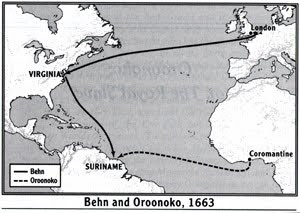
Aphra Behn
1640? - 1689
1640? - 1689
Short biography from Melanie Ulrich, English Department, University of Texas at Austin:
Behn appears to have been born to a barber (or innkeeper) near Canterbury. Her family possessed the merest whiff of gentility, though her mother's acting as nurse to the prominent Colepeper children presumably helped her own daughter meet influential and intellectual figures, including the famous Sidney family. Through these connections, or through her father's clientele, who may have included some of the many Huguenot refugees in the region, Behn picked up French and Dutch. She seems to have spent her leisure absorbing French romances, like those by La Calprenede. It is speculated that at a young age, Behn became involved in espionage for the Royalist cause, through some of Colepeper's connections.
Most (though not all) authorities believe that Behn, as the narrator of Oroonoko, did in fact visit Suriname, perhaps in 1663/4. She may also have seen Virginia, site of her drama The Widow Ranter. Few believe that her father, like the narrator's, was appointed to be Lieutenant-Governor of Suriname and the islands. She may, instead, have been there as someone's mistress, or else as a spy. In any event, her knowledge of the personalities of that colony seems both authentic and too intimate to be second-hand. Of Oroonoko, there is no historical trace.
Behn's husband is a particularly misty figure, who may have actually been her lover, may have been a bona-fide husband, or may never have existed. It is possible that one Johan Behn, of the ship King David, which had sailed in the West Indies, may have met and married Aphra on the return trip from Suriname. Whether Johan quickly died or else simply separated from Aphra is unknown, but he never appears in any future episodes of her life.

In 1667, Behn resumed (or began) her spying activities, working for Charles II in Holland. Pursuing this end, she ran into debt, which Charles II refused to pay. Judging from surviving letters, she was in dire financial straits, and may have spent time in debtor's prison. If so, she quickly got out again, metamorphosed into a playwright and poet. Her first, very successful, play was The Forced Marriage, performed at Lincoln's Inn Fields by the Duke's Company. Although drama allowed Behn to feed herself, she never seems to have been financially comfortable. Nonetheless, she seems to have enjoyed the milieu, and to have been inspired by the transgressive lives of the actresses she met, many of whom (like the famous Nell Gwyn) combined sex work with acting. The parallels between their careers and hers, their need to please and entertain, their dubious sexual morality, were apparent to her, as Behn wrote plays and fictions dealing with actresses, courtesans, and near-courtesans with whom the narrators seem to identify.
For the next 22 years, she supported herself by her writing, producing, among others, The Rover, The Feign'd Courtisans, Love-Letters from a Nobleman to his Sister (called the first major epistolary novel in English), The Fair Jilt, Oroonoko, and The Widow Ranter (staged posthumously). Although she was a very popular, if controversial figure in her time, even garnering for herself a burial spot in Westminster Abbey - an honor reserved for major national figures like Geoffrey Chaucer, Charles Dickens, and Charlotte and Emily Bronte - her popularity plummeted immediately after her death in 1689. Behn's memory was reviled until Virginia Woolf turned her into a feminist icon, claiming in A Room of One's Own: "All women together ought to let flowers fall upon the tomb of Aphra Behn, for it was she who earned them the right to speak their minds."

Oroonoko became even more popular when adapted for the stage. While Oroonoko is played
by an English actor with African make-up, Imoinda is played as a white woman.
This article explains how common the tortures inflicted on Oroonoko were in the punishment of slaves in Suriname (roughly 25 years after the period of Oroonoko).






